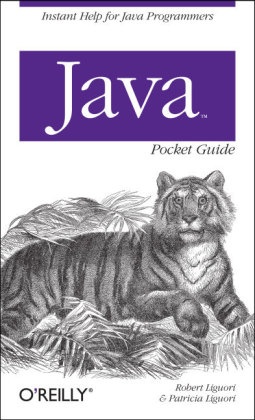Partager
Patricia Liguori, Robert J. Liguori
Java Pocket Guide - Instant Help for Java Programmers
Anglais · Livre de poche
Description
How many times have you reached an impasse while writing code because you couldn't remember how something in Java worked? This new pocket guide is designed to keep you moving. Concise, convenient and easy to use, the Java Pocket Guide gives you Java stripped down to its bare essentials -- in fact, it's the only book on Java that you can actually fit in your pocket.Written by Robert and Patricia Liguori, senior software and lead information engineers for Java-based air traffic management and simulation environments, Java Pocket Guide contains everything you really need to know about Java, particularly everything you need to remember. The book pays special attention to the new areas in Java 5 and 6, such as generics and annotations.Why do you need the Java Pocket Guide? It's the only CliffsNotes-style guide to Java available Lets you find important things quickly without consulting 1000-page tutorials Includes many command-line options Organized for quick and easy use on the jobIf you're looking to learn some aspect of Java, this is not your book. Java Pocket Guide is for the experienced Java programmers among you who need quick reminders to jog your memory on how something in the language works. Simply put, this pocket guide offers practical help for practicing developers.
Table des matières
Inhaltsverzeichnis
Preface
Part I.. Language
Naming Conventions
Class Names
Interface Names
Method Names
Instance and Static Variable Names
Parameter and Local Variables Names
Generic Type Parameter Names
Constant Names
Enumeration Names
Package Names
Acronyms
Chapter 2:. Lexical Elements
Unicode and ASCII
Comments
Keywords
Identifiers
Separators
Operators
Literals
Escape Sequences
Unicode Currency Symbols
Fundamental Types
Primitive Types
Literals for Primitive Types
Floating-Point Entities
Numeric Promotion of Primitive Types
Wrapper Classes
Autoboxing and Unboxing
Chapter 4:. Reference Types
Comparing Reference Types to Primitive Types
Default Values
Conversion of Reference Types
Converting Between Primitives and Reference Types
Passing Reference Types into Methods
Comparing Reference Types
Copying Reference Types
Memory Allocation and Garbage Collection of Reference Types
Chapter 5:. Object-Oriented Programming
Classes and Objects
Variable Length Argument Lists
Abstract Classes and Abstract Methods
Static Data Members, Static Methods, and Static Constants
Interfaces
Enumerations
Annotations Types
Chapter 6:. Statements and Blocks
Expression Statements
Empty Statement
Blocks
Conditional Statements
Iteration Statements
Transfer of Control
Synchronized Statement
Assert Statement
Exception Handling Statements
Chapter 7:. Exception Handling
The Exception Hierarchy
Checked/Unchecked Exceptions and Errors
Common Checked/Unchecked Exceptions and Errors
Exception Handling Keywords
The Exception Handling Process
Defining Your Own Exception Class
Printing Information About Exceptions
Java Modifiers
Access Modifiers
Other (Non-Access) Modifiers
Part II.. Platform
Java Platform, SE
Common Java SE API Libraries
Development Basics
Java Runtime Environment
Java Development Kit
Java Program Structure
Command-Line Tools
Classpath
Basic Input and Output
Standard Streams in, out, and err
Class Hierarchy for Basic Input and Output
File Reading and Writing
Socket Reading and Writing
Serialization
Zipping and Unzipping Files
File and Directory Handling
Java Collections Framework
The Collection Interface
Implementations
Collection Framework Methods Collections Class Algorithms
Algorithm Efficiencies
Comparator Interface
Generics Framework
Generic Classes and Interfaces
Constructors with Generics
Substitution Principle
Type Parameters, Wildcards, and Bounds
The Get and Put Principle
Generic Specialization
Generic Methods in Raw Types
Concurrency
Creating Threads
Thread States
Thread Priorities
Common Methods
Synchronization
Concurrent Utilities
Memory Management
Garbage Collectors
Memory Management Tools
Command-Line Options
Resizing the JVM Heap
Interfacing with the GC
The Java Scripting API
Scripting Languages
Script Engine Implementations
Setting Up Scripting Languages and Engines
Third-Party Tools
Development Tools
Libraries
IDEs
Web Application Platforms
Scripting Languages
UML Basics
Class Diagrams
Object Diagrams
Graphical Icon Representation
Connectors
Multiplicity Indicators
Role Names
Class Relationships
Sequence Diagrams
Index
A propos de l'auteur
Robert Liguori ist ein erfahrener Software-Entwickler und entwickelt, betreut und testet Luftverkehrsverwaltungssysteme seit 1996. Zur Zeit leitet er die Entwicklung zahlreicher Java-Anwendungen in diesem Bereich. Er hat einen Bachelor in Informatik von der Richard Stockton College in New Jersey und ist Sun Certified Java Professional.
Patricia Liguori ist leitende Systementwicklerin und entwickelt seit 1994 Luftverkehrüberwachungssysteme und Simulationsumgebungen. Neben Java beherrscht sie Relationale Datenbanken, XML und XSL. In den letzten Jahren hat sie die Entwicklung von Systemen geleitet, die mehrere Organisationen für die Forschung und Analyse von Luftfahrtsystemen einsetzen. Sie hat einen B.S. in Business Administration von der Duquesne University, einen B.S. in Informatik vom Richard Stockton College in New Jersey und einen Master in Informatik vom New Jersey Institute of Technology.
Détails du produit
| Auteurs | Patricia Liguori, Robert J. Liguori |
| Edition | O'Reilly Media |
| Langues | Anglais |
| Format d'édition | Livre de poche |
| Sortie | 02.04.2008 |
| EAN | 9780596514198 |
| ISBN | 978-0-596-51419-8 |
| Pages | 177 |
| Poids | 172 g |
| Catégorie |
Sciences naturelles, médecine, informatique, technique
> Informatique, ordinateurs
> Langages de programmation
|
Commentaires des clients
Aucune analyse n'a été rédigée sur cet article pour le moment. Sois le premier à donner ton avis et aide les autres utilisateurs à prendre leur décision d'achat.
Écris un commentaire
Super ou nul ? Donne ton propre avis.

